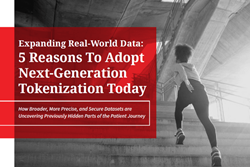Real-World Data and Tokenization are Poised to Take Individual and Population Insights to the Next Level
Tokenization Playbook and On-Demand Webinar
The potential for more actionable, effective data analysis is here.
Healthcare organizations that optimally leverage clinically validated and complementary datasets can enhance organizational initiatives and patient outcomes. To combine complementary datasets to direct care data, next-generation tokenization can make a world of difference. Next-generation tokenization fueled by a referential token holds the future of compliantly disseminating data to inform strategies around improving patient outcomes.
Referential TokenizationReferential tokenization helps healthcare organizations capture more meaningful insights about their population such as social determinants of health (SDoH) and provide added context while maintaining patient privacy. The value of tokenization is in striking a balance between learning more about an individual and a population's health while safeguarding privacy in a way that makes it almost impossible to identify a specific person. 1,2

Fill out the form on the right to download the playbook,
5 Reasons to Adopt Next-Generation Tokenization
Today. And discover how broader, more precise, and
secure datasets are uncovering previously hidden parts of the patient journey.

The Real World Needs Real-World Data
Although important insights result from clinical trials, analyzing tokenized real-world data (RWD) has a very essential role to play. RWD captures a wider scope of what happens to individuals and populations outside of clinical settings and can include individuals and communities that are often underrepresented in clinical trials. This strategy can also make it easier for researchers to study a greater number of people faster, and helping to overcome the enrollment issues, costs, and ethical concerns that can sometimes pose challenges when it comes to traditional clinical trials.
RWD holds the potential to include for analysis more diverse populations -- so that healthcare organizations can fine tune their outreach and treatment strategies while driving towards creating healthier communities.
In addition to population-level understanding, tokenization can provide organizations with insights to accomplish more precise medicine objectives, taking what are generally inferences from data now and elevating them toward true insights.3
Next-generation tokenization allows stronger, more precise connections among different and disparate databases. The aim is to verify an individual in a clinical database is an exact match for the same person in a billing system and in a third-party electronic health record, for example. Currently, many data analysts do their best to make these exact matches but adding verification from next-generation tokenization – leveraging a referential data layer – adds precision and confidence.
 Making Healthcare Better Together
Making Healthcare Better Together
The ultimate goal is better data for enhanced insight to help that individual and their community experience better health and wellbeing. LexisNexis® Risk Solutions brings these disparate data sources together into a singular, secure database that healthcare organizations can leverage for improving care for the individuals and populations they serve.
Next-generation tokenization compares favorably to other technologies.
For example, tokenization provides more benefits than Safe Harbor data de-identification, which can be akin to taking a magic marker and blocking out someone’s name and social security number while leaving the remainder of their health records discoverable. Tokenization can even be optimized in combination with machine learning and artificial intelligence systems in healthcare.4
 Advancing Breast Cancer Research With Tokenization
Advancing Breast Cancer Research With Tokenization
Breast cancer imaging is a prime example of how advanced technology can help healthcare organizations become more precise. Cancer screening not only has the potential to become more accurate, but actual images can be stored in databases now, not just data.5 This helps clinicians compare images over time, learn what they otherwise might have missed previously, and monitor treatment response or cancer progression longitudinally.
Leveraging data can help care providers in identifying women who may be less compliant with regular mammograms, a concern that has been amplified by the COVID-19 pandemic. Modifiable factors that make many women less likely to stick with recommended checkups could be identified through data and addressed to potentially improve long-term outcomes.6
Healthcare organizations are bound to be traditionally siloed data sources that do not combine well or sometimes not at all to better understand and serve individuals and larger populations. Others have adopted less than ideal, legacy tokenization strategies, which rely on unreliable deterministic and probabilistic matching. So why not choose next-generation tokenization technology powered by a referential data layer and go even further?
3https://www.healthcareittoday.com/2022/09/13/revolutionizing-real-world-data-using-next-generation-tokenization-technology/
4https://www.nature.com/articles/s41598-020-58178-1
5https://cancercenter.ai/database/breast-cancer-images/
6https://jamanetwork.com/journals/jamaoncology/fullarticle/2778915
Let’s Talk About Your Need for More Precise Data
Watch this webinar to learn more about the value of real-world data, next-generation tokenization, and how your organization can gain by adding more and more meaningful social determinants of health and other context to your data analysis.
Related Products
-
Gravitas®
Unlock the power of real-world data for healthcare with a comprehensive data network and next-generation de-identification technology.
Learn More -
MarketView™
Understand physician claim patterns and affiliations
Learn More -
Social Determinants of Health
Social Determinants of Health (SDOH) fuel insights into health risks and the ability to proactively impact health outcomes for veterans, military and others.
Learn More
